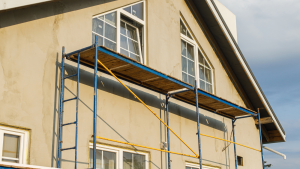Smart home technology has evolved dramatically from its early days of controlling essential functions like lights and thermostats. Today’s systems are sophisticated networks that integrate various aspects of home management, offering unprecedented convenience, security, and efficiency. Modern smart homes allow homeowners to control and monitor their environments through smartphones or voice commands.
For almost forty years, CMB Wayne Stucco & EIFS has established and nurtured relationships with homeowners, business owners, contractors, builders, developers, and architects. Reach out now for a free consultation. Whether you prefer to call or email, we’re here to assist and address any questions you may have.
Popular Smart Technologies for Home Environments
The variety of smart devices available today enhances multiple aspects of home life. Some of the most popular technologies include:
- Bright Lighting: Control the brightness and color of your lights with an app or voice commands. These lights can be programmed to adjust automatically based on the time of day or room occupancy.
- Smart Thermostats: Devices like the Nest Thermostat learn your schedule and preferences to optimize comfort while conserving energy and reducing costs.
- Smart Security Systems: This category includes video doorbells, security cameras, and smart locks, all providing real-time monitoring and alerts for unusual activity.
- Smart Appliances: From refrigerators that track groceries to ovens that can be preheated remotely, these appliances streamline daily tasks and enhance efficiency.
- Voice Assistants: Devices like Amazon Echo and Google Home facilitate voice control of other smart devices and assist with tasks like playing music or setting reminders.
Seamlessly Integrating Technology with Design
Smart home technology is designed to complement your home’s décor. Many devices feature stylish, modern designs that blend seamlessly with your surroundings. Smart light switches and plugs look traditional, while smart speakers and hubs often come in sleek, contemporary finishes. You can select options that match your interior, ensuring technology enhances rather than disrupts your home’s aesthetic.
Promoting Sustainability
Smart home technology supports sustainable living. Intelligent lighting and thermostat systems reduce energy consumption, lowering utility bills and benefiting the environment. Intelligent irrigation systems optimize water usage for gardens, while many smart appliances include energy-saving modes and provide tips for reducing energy use.
Future Trends in Smart Home Technology
Exciting possibilities await smart home technologies in the future.
- AI-Powered Homes: Artificial intelligence (AI) will enable homes to become familiar with your routines and tastes, enabling them to adjust settings like lighting and temperature proactively. AI might suggest meal plans based on your routine and automatically adjust the thermostat for optimal comfort and energy efficiency.
- Interconnected Ecosystems: Future smart homes will feature seamless interoperability between devices from different brands. Enhanced compatibility standards will allow devices to communicate and work together smoothly, providing unified control through a single interface—a smartphone, voice assistant, or dedicated control panel.
- Health Monitoring: Smart home technology will increasingly focus on health and wellness. Advanced sensors will monitor air quality, humidity levels, and sleep patterns, offering actionable insights to improve your environment. Some devices will detect falls or medical emergencies and alert emergency services or designated contacts, enhancing safety for vulnerable family members.
- Sustainable Innovations: With growing environmental awareness, eco-friendly smart devices and systems are rising. Innovations will prioritize energy efficiency and conservation, featuring solar power integration, real-time energy usage monitoring, and automated systems that optimize energy consumption. For example, intelligent irrigation systems adjust watering schedules based on weather forecasts, significantly reducing water waste.
Conclusion
Smart home technology integration is transforming our lives, making our homes more convenient, secure, and energy-efficient. Smart homes have evolved into sophisticated networks controllable via smartphones or voice commands since their modest beginnings. Future advancements in AI, interconnected ecosystems, health monitoring, and sustainable innovations promise limitless potential. Embracing these advancements keeps us current and contributes to a more sustainable future for everyone.

